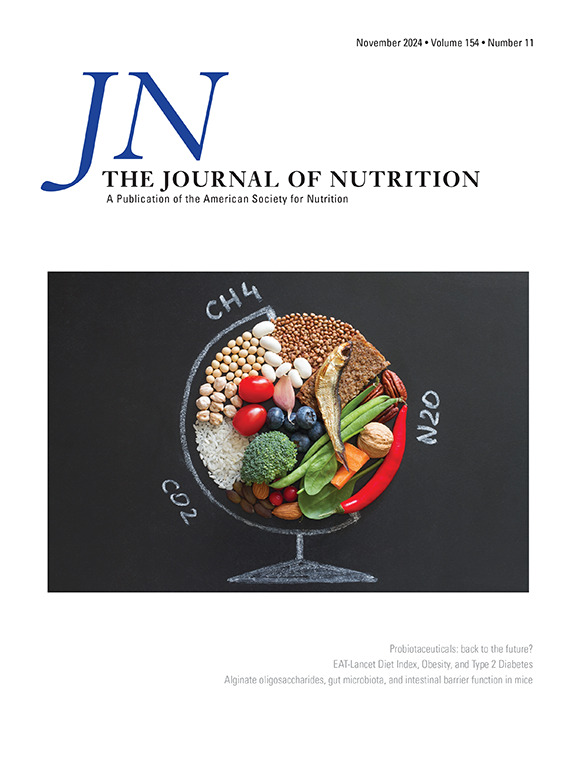婴儿配方奶粉和辅食中添加糖的摄入量:一项纵向调查及其对婴儿体重增加的影响。
IF 3.7
3区 医学
Q2 NUTRITION & DIETETICS
引用次数: 0
摘要
背景:婴儿配方奶粉中含有添加糖,尽管国家建议婴儿应避免添加糖。目的:估计平均每天从配方食品和辅食中摄入的添加糖。研究低收入家庭婴儿从配方食品和辅食中摄入的添加糖与体重状况之间的关系。方法:在2019年8月至2021年11月期间,从主要为医疗补助接受者服务的儿科诊所招募母婴二人组,无论喂养方式如何。在婴儿6、9和12个月时进行24小时喂养回忆。对于直接母乳喂养的婴儿,我们使用按年龄划分的平均预期奶量摄入量。根据健康记录测量值计算年龄体重和长度体重z分数。使用描述性、双变量检验和多水平线性增长模型。结果:大多数参与者(n=234)是非裔美国人(39%)或拉丁裔(38%)。婴儿每天平均从辅食中摄入7克添加糖,从配方奶粉中摄入33克,其中配方奶粉是6个月和9个月时的主要来源。与母乳或无糖配方奶粉喂养的婴儿相比,配方奶粉喂养的婴儿每天因添加糖摄入的卡路里明显更高(p = 0.034)。每天每从配方奶粉中添加10克糖,婴儿的体重长度z分数平均增加0.060 (SE = 0.018, p = .001)。结论:与辅食相比,配方奶粉显著增加了婴儿的添加糖摄入量。配方奶粉中的添加糖与婴儿体重增加之间存在显著的正相关关系,这表明有必要制定法规限制配方奶粉中的添加糖,并在配方食品标签上注明添加糖的信息。本文章由计算机程序翻译,如有差异,请以英文原文为准。
Added Sugar Intake from Infant Formula and Complementary Foods: A Longitudinal Investigation and Implications for Infant Weight Gain
Background
Infant formula contains added sugar, although national recommendations are that added sugar should be avoided for infants.
Objectives
This study aims to estimate average daily added sugar intake from formula and complementary foods and examine associations between added sugar intake from formula and complementary foods and weight status among infants in low-income households.
Methods
Between August 2019 and November 2021, mother–infant dyads were recruited from a pediatric clinic primarily serving Medicaid recipients, regardless of feeding type. 24-h feeding recalls were conducted on infants aged 6, 9, and 12 mo. For directly breast-fed infants, we used the average expected milk volume intake by age. Weight-for-age and weight-for-length z-scores were calculated from health record measurements. Descriptives, bivariate tests, and multilevel linear growth modeling were used.
Results
Most participants (n = 234) were African American (39%) or Latino (38%). Infants’ daily added sugar intake was on average 7 g from complementary foods and 33 g from formula, with formula being the major source at 6 and 9 mo. Daily intake of calories due to added sugar was significantly higher among formula-fed infants compared with breast milk or sugar-free formula-fed infants (P = 0.034). For every 10 g of added sugar from formula daily, infants’ weight-for-length z-scores increased by an average of 0.060 (SE = 0.018, P = 0.001).
Conclusions
Formula significantly contributes to added sugar intake among infants compared with complementary foods. A significant positive association between added sugar from formula and infant weight gain suggests the need for regulations limiting added sugar in formula and including added sugar information on formula food labels.
求助全文
通过发布文献求助,成功后即可免费获取论文全文。
去求助
来源期刊

Journal of Nutrition
医学-营养学
CiteScore
7.60
自引率
4.80%
发文量
260
审稿时长
39 days
期刊介绍:
The Journal of Nutrition (JN/J Nutr) publishes peer-reviewed original research papers covering all aspects of experimental nutrition in humans and other animal species; special articles such as reviews and biographies of prominent nutrition scientists; and issues, opinions, and commentaries on controversial issues in nutrition. Supplements are frequently published to provide extended discussion of topics of special interest.
 求助内容:
求助内容: 应助结果提醒方式:
应助结果提醒方式:


